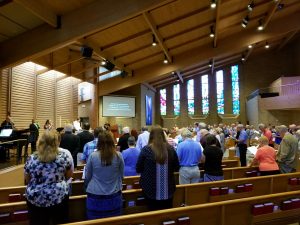
A few days ago a colleague shared an article with me titled “Ten Things Churches Should Stop Saying.” Written by Paul Miller – Support Minister for Waterloo Presbytery of the United Church of Canada – the piece lists 10 problematic statements that are frequently used in church life followed by a positive response to each.
Overcoming this often pervasive form of negativity is key to building a healthy congregational culture. Toward that end, I share two items from Miller’s list before offering two of my own.
- We can’t do that. People might leave. A positive response centers on communicating well, wisely, and frequently while remaining committed to staying the course on specific changes.
- We are an aging congregation. A positive response focuses on the strengths of your existing congregation rather than perceived shortcomings, including the wisdom found in a faith community comprised primarily of mature adults.
- We are always struggling financially. A positive response focuses on the opportunities this struggle enables for creatively visioning a new feature (often one with lower ongoing fixed costs for buildings).
- We see fewer and fewer people in worship every year. A positive response both helps people understand why this is the new normal in general and not just in your congregation while also shifting the weekly performance dashboard from worship attendance to metrics aligned with your congregation’s mission, vision and values.
So What?
I have worshiped in 40 different congregations over the last two years. After making just one visit I could divide congregations into thirds
- Positive. In these congregations people were friendly, stories were positive, and nearly everyone was invested in a making real a desired future state that included people not yet a part of the community of faith.
- Negative. In these congregations people were on their own or huddle in small groups of those they knew well, stories were hard to come by or ways to express frustration or concern, and nearly every announcement focused on activities for members or financial needs related to maintenance.
- TBD. In these congregations I was unable to decide if they were somewhere between positive and negative or if my limited experience was not representative of a normal day in the life of a given community of faith.
Think about your own congregation:
- Overall is your congregation more positive or negative? If you answered positive, do you think a newcomer would provide the same answer? Explain the specific reasons for choosing whichever answer you choose.
- What one negative statement do you hear most often in your community of faith (feel free to choose from the list above or share another)? How are you working to overcome this now? What steps do you feel your church leaders should take to do so?